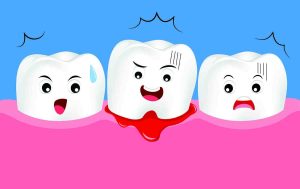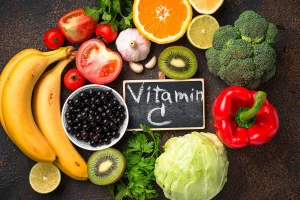Understanding Gum Bleeding
Gum bleeding, a common dental woe, can be a distressing experience for many. It’s often a sign of underlying issues within the oral cavity. While occasional bleeding might not seem alarming, Vitamin C recurrent bleeding gums could indicate gum disease or other health concerns. Explore More About Other Health Problems And Their Solutions (Swollen Ankles Triggers)
Causes of Gum Bleeding
Gum bleeding can stem from various factors, including:
Poor Oral Hygiene
Inadequate brushing and flossing can lead to plaque buildup along the gum line, causing inflammation known as gingivitis. If left untreated, gingivitis can progress to more severe forms of gum disease, such as periodontitis, characterized by gum recession and bleeding.
Vitamin Deficiencies
Vitamin C deficiency, in particular, is associated with bleeding gums. This essential nutrient plays a crucial role in maintaining gum health by supporting collagen production, which is vital for gum tissue integrity. Without an adequate supply of vitamin C, gums become more susceptible to inflammation and bleeding.
Hormonal Changes
Fluctuations in hormone levels, such as during pregnancy or puberty, can increase blood flow to the gums, making them more prone to bleeding, especially during brushing or flossing.
Medical Conditions
Certain medical conditions, such as diabetes and blood disorders, can compromise gum health and increase the risk of bleeding gums.

The Role of Vitamin C in Gum Health
Collagen Synthesis
Vitamin C, also known as ascorbic acid, is a potent antioxidant that supports collagen synthesis. Collagen is a structural protein essential for maintaining the integrity of gum tissue. Adequate intake of vitamin C ensures proper collagen formation, which is crucial for healthy gums.
Anti-Inflammatory Properties
In addition to its role in collagen production, vitamin C exhibits anti-inflammatory properties. By reducing inflammation in the gums, vitamin C helps alleviate symptoms associated with gingivitis and prevents progression to more severe forms of gum disease.
Immune Support
Vitamin C is renowned for its immune-boosting properties. A robust immune system is essential for defending against oral bacteria that contribute to gum disease. By bolstering the immune response, vitamin C helps protect against gum infections and promotes overall oral health.
Dietary Sources of Vitamin C
Fruits
Citrus fruits, such as oranges, lemons, and grapefruits, are rich sources of vitamin C. Other fruits, including strawberries, kiwis, and papayas, also provide significant amounts of this essential nutrient.
Vegetables
Leafy greens, such as spinach, kale, and broccoli, are excellent sources of vitamin. Bell peppers, tomatoes, and Brussels sprouts are also nutritious options to incorporate into your diet.
Supplements
In addition to dietary sources, vitamin supplements are available for those who may have difficulty meeting their daily requirements through food alone. However, it’s essential to consult with a healthcare professional before starting any supplement regimen.

Incorporating Vitamin C into Your Daily Routine
Balanced Diet
Maintaining a balanced diet rich in fruits and vegetables is key to ensuring an adequate intake. Aim to include a variety of vitamin C-rich foods in your meals to support overall health, including gum health.
Oral Hygiene Practices
Alongside a nutritious diet, practicing good oral hygiene is essential for preventing gum disease and reducing the risk of gum bleeding. Brushing twice a day, flossing daily, and using an antiseptic mouthwash can help keep your gums healthy.
Regular Dental Checkups
Routine dental checkups are crucial for detecting early signs of gum disease and addressing any concerns promptly. Your dentist can provide personalized recommendations for maintaining optimal gum health, including the role of in preventing gum bleeding.
Dietary Sources
| Food Source | Vitamin C Content (per 100g) |
|---|---|
| Oranges | 53.2mg |
| Strawberries | 58.8mg |
| Kale | 93.4mg |
| Bell Peppers | 128mg |
| Kiwi | 92.7mg |
Values are approximate and may vary.
Conclusion
In conclusion, plays a pivotal role in maintaining gum health and preventing bleeding gums. By supporting collagen synthesis, reducing inflammation, and boosting the immune system, helps keep gums strong and resilient. Incorporating -rich foods into your diet and practicing good oral hygiene habits are essential steps in promoting healthy gums and overall oral wellness.
Remember, taking care of your gums is integral to your overall health, and ensuring an adequate intake of is a simple yet effective way to support gum health and prevent bleeding. Start prioritizing your oral health today for a brighter, healthier smile tomorrow.




